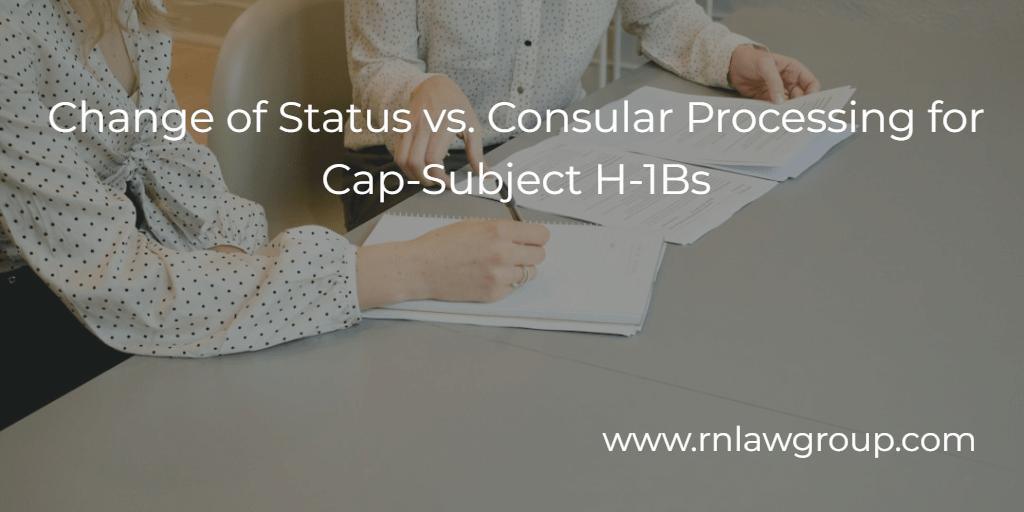
Change of Status vs. Consular Processing for Cap-Subject H-1Bs
Cap-subject H-1B beneficiaries in the U.S. whose employers are preparing to file an I-129 petition on their behalf will need to decide with their companies whether their petition will request a change of their status to H-1B within the U.S., or whether they will apply for the H-1B visa at a U.S. consulate abroad. With the June 30 filing deadline approaching, employees should carefully weigh these options and the accompanying risks to ensure they are making the best choice for their situation.
Change of Status
For beneficiaries who are currently in the U.S., such as F-1 graduates with OPT work authorization, their H-1B petitioner can request a change of status in the I-129 form, meaning that if the beneficiary remains in the U.S. in valid nonimmigrant status from the time the petition is filed, their status will automatically change to H-1B on October 1 (as long as the I-129 petition is approved by then, and as long as the I-129 form listed October 1 as the start date). The employee would not need to exit the U.S. or apply for a visa at a consulate in order to start their H-1B status; the I-94 attached to the I-797 Approval Notice will automatically change their status to H-1B as of the effective date. This is the fastest way for a beneficiary to start their H-1B status, as October 1 is the earliest that a new cap-subject H-1B period of stay can begin.
Consular Processing
Given the ease of transitioning to H-1B status via a change of status request, why would some beneficiaries opt for consular processing, even if they are in the U.S. in valid nonimmigrant status? For applicants currently in F-1 status with OPT, their motivations are often twofold:
- If they are early in their OPT period, they may wish to continue working as an OPT employee longer and make use of a potential 2-year STEM OPT extension, thereby postponing the start of their H-1B status and the accompanying 6-year limit clock, and prolonging the amount of overall work authorization they will have before needing an I-140 approval.
- F-1 OPT employees are also not subject to FICA (social security and Medicare) tax withholdings, since they are considered “non-residents” for tax purposes. H and L visa holders, by contrast, are considered residents for tax purposes and are therefore subject to the income withholdings. Some F-1 employees therefore seek to postpone the move to H-1B status to maximize their tax-free income period.
For H-1B beneficiaries whose I-129 petitions request consular processing, their I-797 Approval Notice will not include the I-94 attachment, meaning that their status will not automatically change on October 1. Instead, they will be required to schedule an appointment at a consulate abroad to apply for the H-1B visa stamp before the end of the H-1B validity period, and will need to provide proof of the continued H-1B job offer from the petitioner during the interview. Their H-1B status in the United States will start after they have entered the U.S. with the H-1B visa and approval notice.
The Risk: Job Loss
While consular processing may be an attractive option, particularly for those with one or more years of OPT work authorization remaining, there are significant risks associated with it, specifically related to job loss. Importantly, postponing activation of H-1B status also postpones being officially counted against the H-1B numerical cap, which puts employees at risk of losing the benefit of this recent H-1B lottery selection if they lose their job before they can be counted. Being selected in the March lottery, and even receiving an I-797 Approval Notice, are, on their own, insufficient to render a beneficiary counted against the H-1B numerical cap. According to 8 CFR 214.2(h)(8)(ii)(A), one of two things must occur in order for an H-1B beneficiary to be considered counted:
- The beneficiary has been issued an H-1B visa by a consulate; or
- The beneficiary has been granted H-1B status in the U.S.
If the beneficiary of an approved consular processing H-1B petition loses their job before they can apply for the visa at a consulate, they essentially lose that H-1B approval and lottery selection, and would need to be selected in a subsequent year’s lottery through a new employer in order to eventually move into H-1B status. This is because a beneficiary cannot apply for the visa at the consulate if the position described in the cap-subject I-129 petition is no longer available to them (the H-1B petitioner will likely have withdrawn the approval as well with USCIS). A beneficiary in this situation would also be unable to have an H-1B transfer application filed on their behalf by a new employer, since they have never been counted against the cap and would therefore still be considered cap-subject beneficiaries. The lottery selection is not transferable to a different employer, and the beneficiary would therefore need to secure a new job offer, lottery registration, and selection before their OPT work authorization expires.
Alternatively, if the beneficiary’s I-129 petition requested a change of status, and they have successfully started their H-1B status on October 1, their cap selection is essentially locked in, and it becomes much easier to change to a new employer and continue H-1B status in the event of job loss. Even if they are terminated by their original H-1B petitioner shortly after October 1, as long as they have maintained valid H-1B status for at least one day, the regulatory 60-day grace period applies and the beneficiary can have a transfer application filed to a new employer, without needing to undergo the lottery ever again.
Cap-subject H-1B beneficiaries should therefore carefully consider the risks before asking their employer to file their I-129 petition with a consular processing request. In the long run, changing to H-1B status as soon as possible and the certainty of cap selection likely outweighs the benefits of prolonging OPT work authorization. H-1B beneficiaries and employers are encouraged to consult with qualified immigration counsel to determine the solutions that best fit their situation.
By: Rebecca Chen
Rebecca Chen is a Partner at Reddy & Neumann. Her representation includes advising clients throughout the non-immigrant and immigrant visa application process, from initial filing, responding to various requests for evidence, and processing at overseas consulates. Her years of experience in the immigration field have made her a knowledgeable resource for complex business immigration matters.

